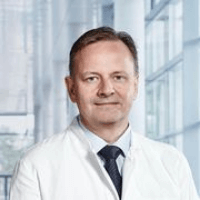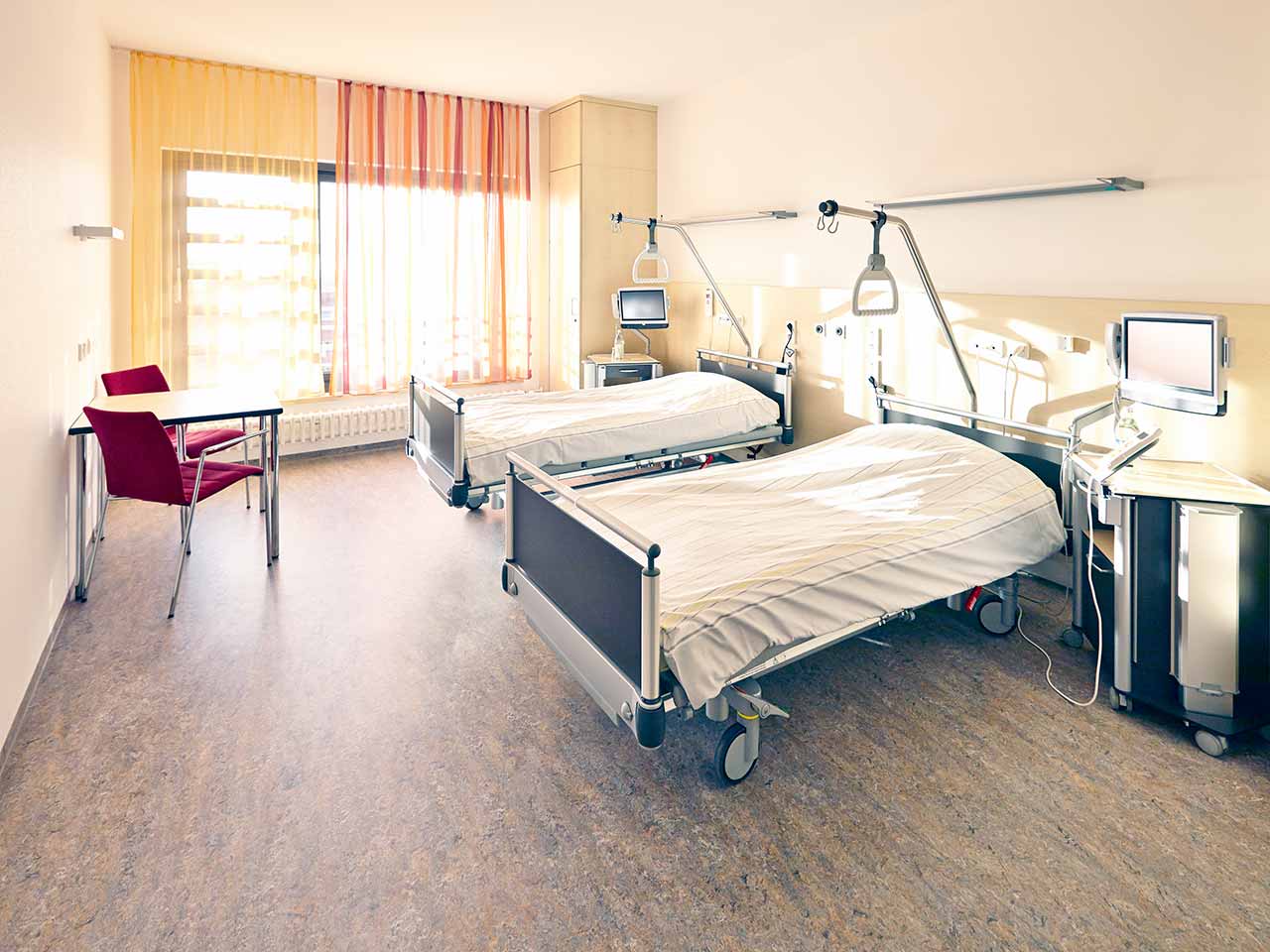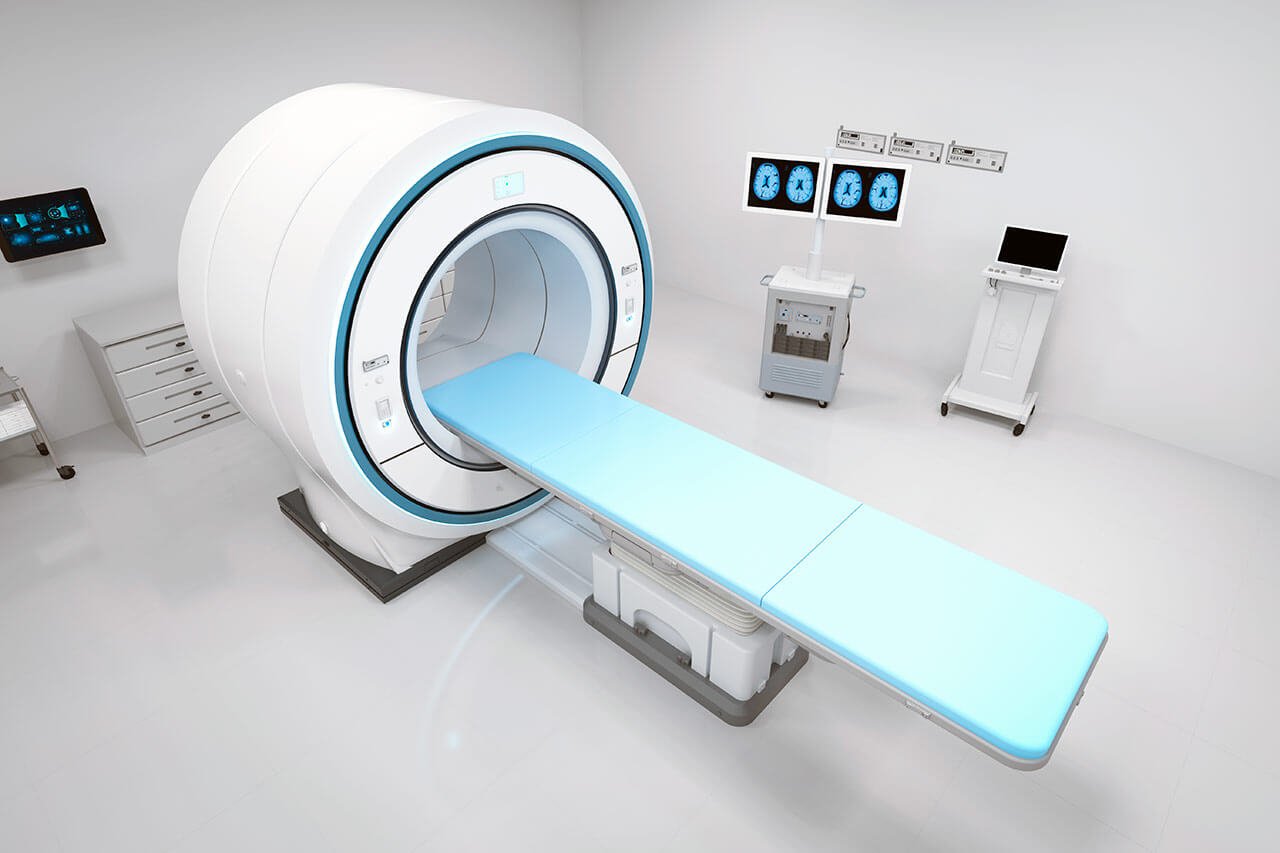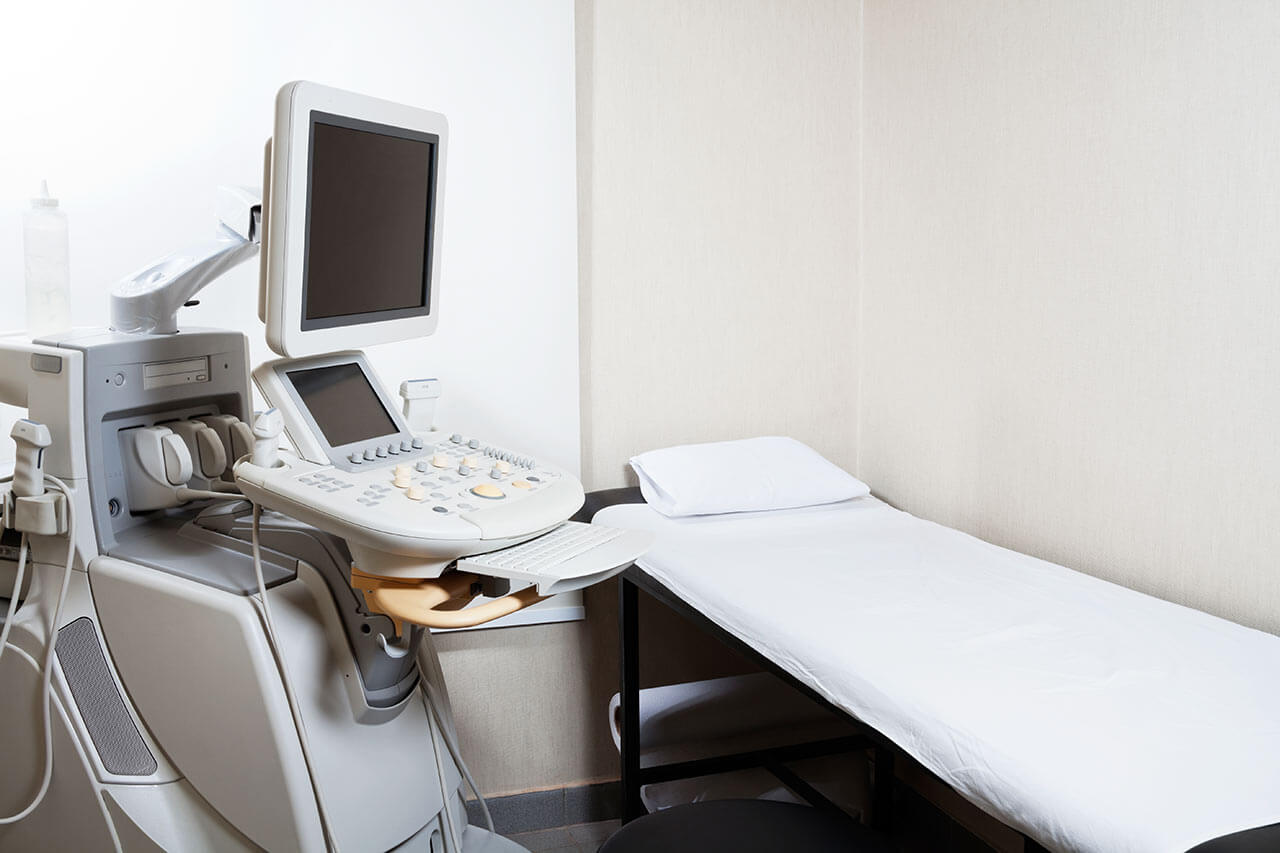
The program includes:
- Initial presentation in the clinic
- clinical history taking
- physical examination
- review of medical records
- laboratory tests:
- complete blood count
- general urine analysis
- biochemical analysis of blood
- TSH-basal, fT3, fT4
- tumor markers
- indicators of inflammation
- indicators blood coagulation
- orbital ultrasound
- CT/MRI/x-ray scan of the head and orbit
- preoperative care
- resection of the tumor
- histologically and immunohistochemically examination of the remote tissues
- symptomatic treatment
- control examinations
- the cost of essential medicines and materials
- nursing services
- full hospital accommodation in 2 bedded room
- explanation of future recommendations
Required documents
- Medical records
- MRI/CT scan (not older than 3 months)
- Biopsy results (if available)
Service
You may also book:
 BookingHealth Price from:
BookingHealth Price from:
About the department
The Department of Adult and Pediatric Oral and Maxillofacial Surgery at the University Hospital Ulm offers the full range of medical services in this medical field. The healthcare facility treats patients of all age groups, from infants to adults. The department specializes in comprehensive treatment for inflammatory diseases of the soft tissues and bones of the face and neck, soft tissue and bone injuries in the maxillofacial area and their complications, benign and malignant maxillofacial tumors, and congenital and acquired maxillofacial defects. The team of oral and maxillofacial surgeons has vast experience in the repair of cleft lip and palate in children. The department also offers top-class services in the field of dental implantology and successfully performs reconstructive and aesthetic plastic interventions in the face and neck. The department is equipped with a modern system for 3D computed tomography of the maxillofacial area. The CT scanner generates high-precision images, with the help of which the specialists can make an accurate diagnosis and prescribe the optimal treatment. Minor surgical interventions are performed in the department on an outpatient basis without a mandatory hospital stay. Extremely complex operations are thoroughly planned using modern computerized systems. Doctors from related specialties, including otolaryngologists, ophthalmologists, and dermatologists, are engaged in the therapeutic process, if necessary. The department is headed by Prof. Dr. med. Dr. dent. Alexander Schramm.
An important focus of work for the department's oral and maxillofacial surgeons is the treatment of dentoalveolar diseases (dentoalveolar surgery). The specialists at the medical facility most often perform interventions for tooth extraction, including wisdom teeth and impacted teeth, resections for benign jaw and soft tissue neoplasms, tumors, or cysts, and procedures for alveolar ridge augmentation prior to dental implantation. At the planning stage of the intervention, the patient undergoes a set of laboratory tests, 3D computed tomography, and/or X-ray scanning. Dentoalveolar interventions are most often performed under local anesthesia. However, sedation may be used in some cases as well.
Dental implantology services are particularly popular in the department. Implant placement is the only method by which a lost tooth can be restored. In addition, the department offers modern implantation techniques such as All-on-4 and All-on-6 to restore the entire tooth row. The essence of the dental implantation procedure is as follows: an artificial root is implanted into the patient's jawbone, on which a crown or prosthesis is then placed. Dental implants are made of titanium and its alloys. This excludes rejection of the transplanted material because titanium is a biocompatible material. A huge advantage of dental implants is their long life, as quality implants can serve the patient for 25-30 years. In addition, the implant visually does not differ from the natural tooth and perfectly fulfills the chewing function. The procedure of dental implantation is performed under local anesthesia, so the patient does not feel any pain.
An integral part of the clinical practice of the department's oral and maxillofacial surgeons is carrying out operations to repair cleft lip and palate in children. This congenital deformity not only causes an aesthetic problem but also severe chewing, swallowing, and speech disorders. Doctors from related specialties, such as pediatricians, pediatric surgeons, and otolaryngologists, are engaged in treating children with cleft lip and palate. The surgical repair of this congenital deformity requires the following two operations: cleft lip repair is performed at the age of 3-6 months, and the second one, aimed at cleft palate repair, is usually performed at the age of 1-1.5 years. As the child grows, additional reconstructive plastic surgery may be required. The brilliant professional skills and experience of the department's surgeons guarantee the best treatment results.
The department's main clinical focuses include the following:
- Dentoalveolar surgery
- Dental implantology
- Aesthetic and reconstructive facial plastic surgery
- Surgical repair of cleft lip and palate in children
- Surgical repair of prognathism (distal bite)
- Surgical resection of benign and malignant oral and maxillofacial tumors (in interdisciplinary cooperation)
- Conservative and surgical treatment of oral and maxillofacial injuries, including multiple injuries
- Other medical services
Curriculum vitae
Higher Education and Professional Career
- 1985 - 1986 Military Service, German Armed Forces.
- 1987 - 1994 Medical studies, Faculty of Medicine, Albert Ludwig University of Freiburg, Germany.
- 1994 Thesis defense in Medicine (Dr. med.), Albert Ludwig University of Freiburg, Germany.
- 1994 - 1996 Dentistry studies, Faculty of Dentistry, Albert Ludwig University of Freiburg, Germany.
- 1999 Thesis defense in Dentistry, Albert Ludwig University of Freiburg, Germany.
- 1992 - 1996 Resident, Department of Oral and Maxillofacial Surgery, University Hospital Basel, Switzerland.
- 1996 - 2000 Residency, Department of Oral and Maxillofacial Surgery, University Hospital Freiburg, Germany.
- 2000 Board certification in Oral and Maxillofacial Surgery, Germany.
- 2000 - 2004 Research Fellow and Associate Professor, Department of Oral and Maxillofacial Surgery, University Hospital Freiburg, Germany.
- 2004 Board certification in Facial Plastic Surgery, Germany.
- 2004 Habilitation (Doctorate in Computer-Assisted Oral and Maxillofacial Surgery), Albert Ludwig University of Freiburg, Germany.
- 2004 - 2007 Vice Chairman and Associate Professor in the Department of Oral and Maxillofacial Surgery, Hannover Medical School, Germany.
- 2006 Professorship for Oral and Maxillofacial Surgery, Hannover Medical School, Germany.
- Since 2007 Head Physician, Department of Adult and Pediatric Oral and Maxillofacial Surgery, University Hospital Ulm, Germany.
- Since 2008 Professorship for Oral and Maxillofacial Surgery, University of Ulm, Germany.
Photo of the doctor: (c) Universitätsklinikum Ulm
About hospital
The University Hospital Ulm is an advanced medical complex that provides patients with high-class medical care using the very latest scientific achievements. The medical facility has been performing successful clinical activities for more than 40 years and has long earned an excellent reputation throughout Europe. The hospital regularly demonstrates high treatment success rates, takes an active part in the training of medical students, and works tirelessly on promising research projects.
The university hospital consists of 29 specialized departments and 16 scientific institutes, where more than 7,000 highly qualified employees work for the benefit of their patients. More than 55,000 inpatients and about 300,000 outpatients are treated here every year. The hospital has 1,274 beds. The medical team of the hospital is focused on providing personalized medical services using the most modern and sparing diagnostic and treatment methods.
The University Hospital Ulm is the largest medical complex in the region, and practically all areas of modern medicine are represented here. Transplantology and oncology are among the priority areas of clinical activity in the medical facility. The hospital holds leading positions in the world in bone marrow transplantation. In addition, the hospital has advanced experience in cancer treatment. The Comprehensive Cancer Center is recognized as the leading facility of this kind in the country, and it is certified by the German Cancer Society (DKG). It provides effective treatment for various types of cancer. The center also offers innovative CAR T-cell therapy. In addition, the Cancer Center is actively engaged in research activities to improve available treatment methods and develop innovative therapeutic techniques to fight cancer.
Along with the use of advanced technologies, doctors show respect, understanding, and a humane attitude toward the patient. The medical team includes competent psychologists, who are always ready to provide assistance and support to the patients and their families during the therapeutic process.
Photo: (с) depositphotos
Accommodation in hospital
Patients rooms
The patients of the University Hospital Ulm live in comfortable single and double rooms with a modern design and light colors. All patient rooms have an ensuite bathroom with a toilet and a shower. The patient room furnishings include a comfortable automatically adjustable bed, a bedside table, a wardrobe, a table and chairs, a telephone, a radio, and a TV. Wi-Fi access is also available in patient rooms.
The hospital also offers enhanced-comfort rooms, which additionally have a safe, a refrigerator, and upholstered furniture. The bathroom in the enhanced-comfort room has changeable towels, a cosmetic mirror, a hairdryer, and toiletries.
Meals and Menus
Patients and their accompanying person are offered three meals a day: breakfast, lunch, and dinner. The patient and accompanying person have a choice of three menus every day, including a vegetarian menu. Patients staying in the enhanced-comfort rooms are also offered light snacks, fruits, desserts, and hot and cold drinks in the comfortable lounge area.
If, for some reason, you do not eat all the foods, you will be offered an individual menu. Please inform the medical staff about your dietary preferences prior to treatment.
Further details
Standard rooms include:
![]() Shower
Shower
![]() Toilet
Toilet
![]() Wi-Fi
Wi-Fi
![]() TV
TV
Religion
The hospital has a chapel where Catholic and Protestant services are held weekly. The services are also broadcast on the internal television channel of the hospital. The chapel is open 24 hours a day for visits and prayers.
The services of other religious representatives are available upon request.
Accompanying person
Your accompanying person may stay with you in your patient room or at the hotel of your choice during the inpatient program.
Hotel
You may stay at the hotel of your choice during the outpatient program. Our managers will support you for selecting the best option.






